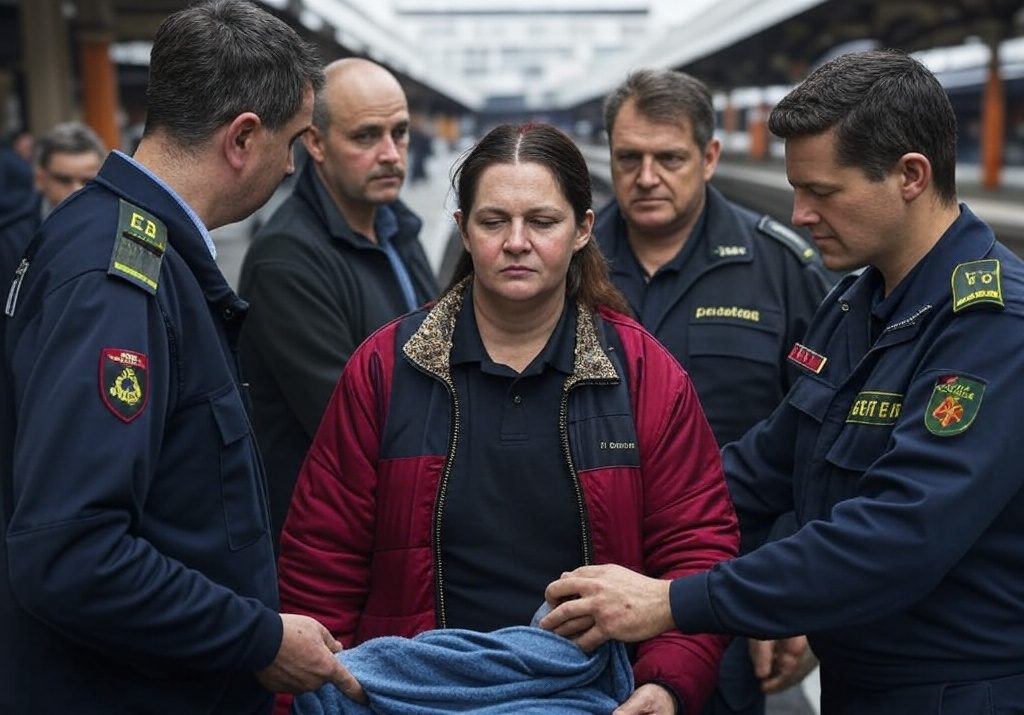The Inspiring Journey of Survival: How Quick Action Saved a Life on the Elizabeth Line
In a heart-stopping incident that highlights the critical importance of immediate medical response, Paul Benson, a 67-year-old man from Barnet, experienced a life-altering moment when he collapsed from cardiac arrest at Liverpool Street Station while traveling with his wife, Lorraine. This remarkable story of survival serves as a powerful reminder of the lifesaving potential of bystander intervention and the need for more defibrillators in urban areas.
**A Sudden Crisis**
On what began as an ordinary day, Paul and Lorraine were making their way through the bustling Liverpool Street Station, ready to board a train on the newly inaugurated Elizabeth line. In an instant, that normalcy shattered when Paul suddenly collapsed in the pedestrian tunnel, succumbing to a cardiac arrest. Fortunately, fate was on his side as he was surrounded by good Samaritans, including an off-duty nurse, doctor, and pharmacist, who were quick to act.
**Immediate Action Saves Lives**
As Paul lay unresponsive on the ground, these compassionate individuals sprang into action. They started administering chest compressions immediately, a critical step that can drastically improve survival rates in cardiac arrest situations. While one bystander focused on keeping Paul’s heart circulating, another rushed to locate the nearest defibrillator, a life-saving device designed to restore normal heart rhythm.
The rapid response of the bystanders proved invaluable. Upon their return with the defibrillator, they were able to shock Paul’s heart back into rhythm. This swift action, combined with high-quality CPR, significantly increased his chances of survival and laid the groundwork for his recovery.
**Transport to Medical Care**
Once stabilized, Paul was taken by the London Ambulance Service to St Bartholomew’s Hospital, which is renowned as one of the nearest Heart Attack Centres. There, he underwent bypass surgery, a procedure that would ultimately save his life. Paul’s successful operation underlines the importance of timely medical intervention in cardiac emergencies.
**A Call for Community Support**
In the aftermath of his experience, Paul Benson has become a passionate advocate for the London Ambulance Charity’s Heart Starters campaign. This initiative aims to provide additional defibrillators to the most deprived areas of London, where access to such critical devices is limited. According to analysis from the London Ambulance Service, many neighborhoods exist as ‘defibrillator deserts,’ where residents have little to no access to these life-saving tools.
Paul emphasizes the urgency of this campaign, stating, “Early use of a defibrillator and chest compressions can more than double a person’s chance of survival. Every second counts when their heart stops beating and pumping oxygen around the body.” This insight underscores the necessity of promoting awareness and education about CPR and defibrillator use among the public.
**Reunion with Heroes**
Recently, Paul had the opportunity to reunite with the paramedics who played a pivotal role in his survival at a London Lifesaver training event held for London Assembly Members at the station. The moment was both emotional and enlightening, as Paul expressed his gratitude: “It’s important that Londoners aren’t frightened to stop and help. It’s very easy to walk past but those who step in can save lives. They can’t make it any worse but they can certainly make it better. Thanks to their help I’ve been able to carry on with my life.”
Paul’s heartfelt words resonate deeply with the mission of the Heart Starters campaign. He added, “I was in very good hands and my good Samaritans kept me alive until the paramedics arrived. Without a defibrillator, I wouldn’t be here.” This statement serves as a potent reminder that every individual has the potential to make a significant difference in life-threatening situations.
**The Importance of Defibrillators**
The role of defibrillators in urban settings cannot be overstated. They are critical in the chain of survival for anyone who experiences a cardiac arrest. The London Ambulance Service has made significant strides in increasing the availability of these devices, recognizing that quick access can drastically improve outcomes for patients.
Naomi Smith, Head of Customer Operations at Transport for London, reinforced this sentiment, stating, “We are absolutely delighted to be working in partnership with the Mayor and our colleagues at London Ambulance Service to support this vital life-saving initiative. We know every second counts when saving a life, so we are pleased that as well as having first-aid trained staff at stations, our customers will have quick access to a defibrillator across the Tube and Overground.”
**Fundraising and Community Involvement**
To support the expansion of defibrillators in London, a fundraising campaign is underway. This initiative aims to raise awareness and resources to ensure that all communities, especially those that are underserved, have the tools necessary to save lives. The campaign seeks to engage local residents, businesses, and organizations to come together in this essential cause.
Through community events, educational workshops, and partnerships with local health organizations, the Heart Starters campaign hopes to create a network of trained individuals capable of responding to cardiac emergencies. This grassroots approach not only fosters a sense of community but also empowers individuals with the knowledge and skills to act when it matters most.
**Conclusion**
Paul Benson’s story is one of resilience, community spirit, and the undeniable impact of quick action in the face of crisis. It serves as a powerful testament to the lifesaving capabilities of individuals who step up during emergencies and the critical need for more accessible defibrillators in urban areas.
As we reflect on this inspiring tale, it is essential to remember that each one of us can play a role in saving lives. By supporting initiatives like the Heart Starters campaign, advocating for the availability of defibrillators, and learning CPR, we can help ensure that no one has to face the tragedy of cardiac arrest alone. Together, we can create a safer environment and empower our communities to act decisively in life-threatening situations.





